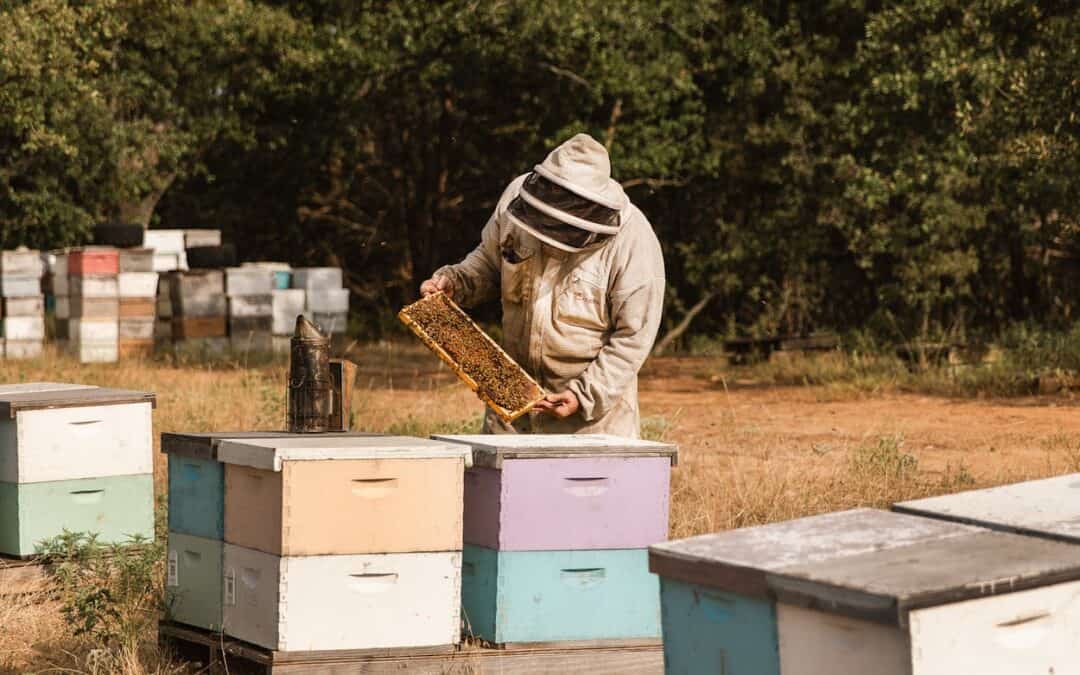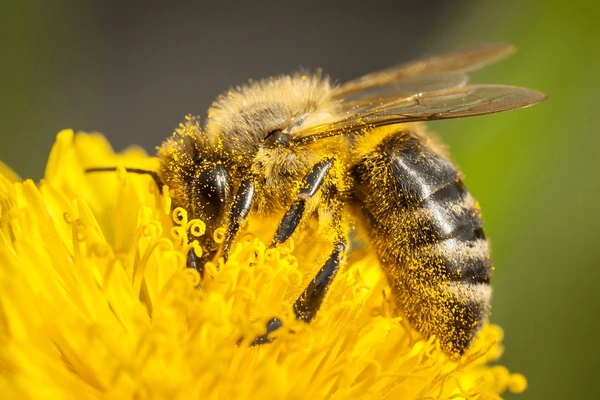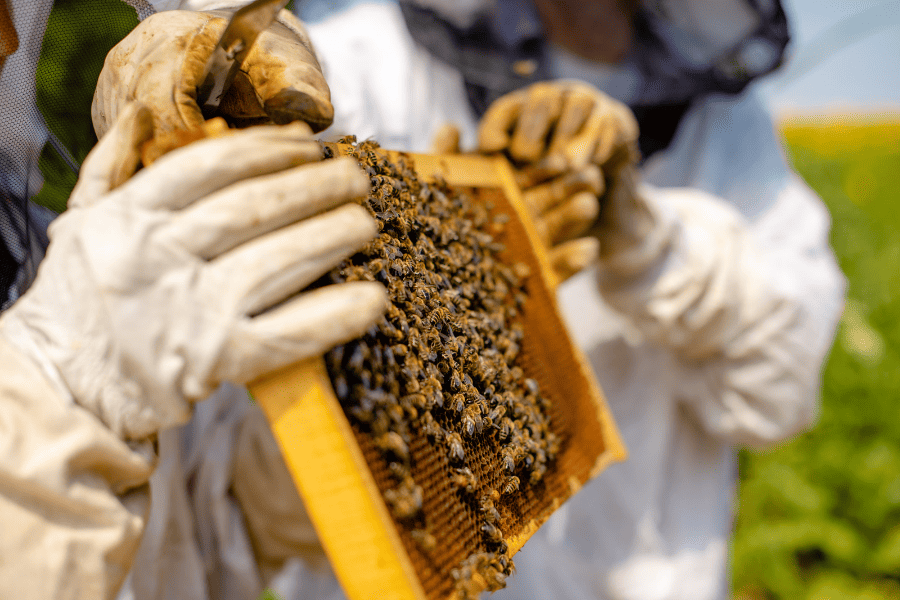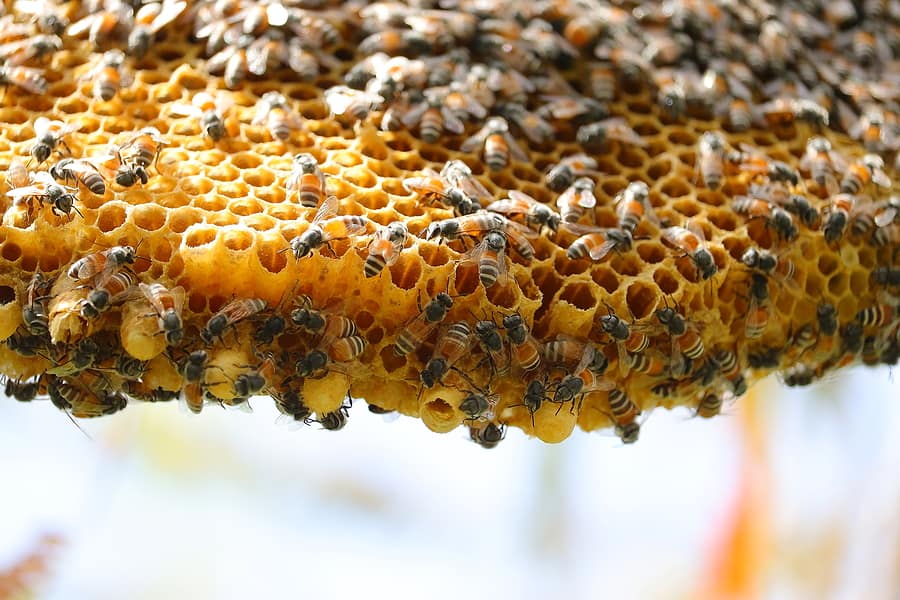READY TO GET STARTED?
REQUEST A FREE ESTIMATE
Fill out the form below or call (888) 466-7849 for a free, no-obligation estimate.

If you’ve discovered a buzzing colony of honeybees on your property, you might be wondering what to do. Don’t worry—there’s a way to handle this situation that protects both your home and these important little pollinators! Honeybee relocation is a great solution, and local beekeepers are key to making it happen.
Honeybees are vital for pollinating plants, which helps flowers bloom and fruits and vegetables grow. But sometimes, they end up in places that aren’t ideal for homeowners. This is where beekeepers step in to relocate the colony, giving the bees a better location while ensuring your property is free of concerns.
Here’s why local beekeepers play such an important role in this process and how it benefits homeowners like you.
Honeybees play a huge role in our environment. They pollinate about one-third of the crops we eat, including fruits, vegetables, nuts, and more. Without them, plants wouldn’t grow as well or produce as much food.
However, as urban areas expand and natural spaces shrink, honeybees sometimes end up building their hives in places like walls, attics, or trees near homes. Relocation protects their colonies and ensures they can continue their important work elsewhere, away from high-traffic areas or living spaces.
Beekeepers are experts in handling honeybee colonies. Their knowledge and care make relocation possible while keeping the bees healthy and productive. Here’s how they help:
When honeybee colonies need to be relocated, local beekeepers and pest control professionals often team up. Here’s what the process looks like:
Choosing honeybee relocation not only solves the immediate problem of a hive on your property but also helps the environment in several ways. Here’s how you benefit:
Honeybees are facing growing challenges like habitat loss and pesticide use . The work of local beekeepers in relocating hives is crucial for supporting bee populations. Without honeybees, we risk losing countless plants that depend on them, from garden flowers to crops that feed our families.
By choosing relocation over extermination, homeowners can make a big difference. It’s a simple decision that protects the bees, your property, and the environment.
Next time a hive appears near your home, remember that local beekeepers are here to help. They’re not just moving bees—they’re protecting pollination, promoting agriculture, and contributing to a thriving planet. Together, we can all do our part to support these incredible pollinators and keep our communities blooming. If you find a hive on your property, reach out to honeybee experts to responsively relocate the bees and protect your space, all while supporting a healthier environment.

Bees are some of the hardest working creatures out there. They pollinate flowers, fruits, and vegetables, making our gardens grow and keeping our food supply strong. If you’re living in Metro Atlanta and want to welcome more bees to your yard, it’s easier than you might think! By making a few small changes, you can create a bee-friendly yard that helps these vital pollinators thrive. Here’s how.
Bee populations have faced many challenges over the years—things like habitat loss and climate change. Without bees, a lot of the plants we rely on for food and beauty wouldn’t thrive. Creating a bee-friendly yard is one-way homeowners can make a big difference. Even small adjustments on your property can provide bees with the resources they need to keep buzzing and pollinating.
Not sure where to start? Here are some simple steps to transform your yard into a haven for pollinators.
Native plants are like a bee’s favorite restaurant—they provide the perfect food and habitat. Bees especially love plants that produce nectar and pollen, so consider adding a variety of flowers, shrubs, and trees that bloom at different times of the year to feed them throughout the seasons.
Some great options for Metro Atlanta include:
Having a mix of colors, shapes, and sizes will also attract a wider variety of bees and other pollinators.
Bees are highly sensitive to pesticides, herbicides, and other chemicals. Instead of using traditional weed killers or harsh sprays, try natural alternatives. For example:
Going chemical-free is not only better for bees but also for your entire backyard ecosystem. Look for green pest control options!
Bees get thirsty too! Add a simple water source to your yard, but make sure it’s bee-friendly. A shallow dish of water with pebbles or floating wood pieces will help bees drink without risking them getting stuck. Change the water regularly to keep it fresh.
While we love a well-manicured yard, bees appreciate a bit of wildness. Allow part of your garden to grow naturally, leaving wildflowers or clovers to sprout. You can even create a small “bee corner” filled with pollinator-friendly blooms and plants that don’t need much trimming.
Not all bees live in hives like honeybees. Many, like bumblebees and solitary bees, make their homes in the ground or inside hollow stems. Consider leaving some bare soil or building a small bee “hotel” from wood, bamboo, or other natural materials. It’s a fun project and a great way to attract nesting bees.
The best part of creating a bee-friendly yard is that the effort pays off in more ways than one. Bees will love your yard, and you’ll benefit too! Here’s how:
You don’t need to overhaul your entire yard to make it bee-friendly. Start small by planting a few native flowers or setting out a water dish. Little changes can make a big impact over time.
If you’d like more tips or professional help with creating a bee-friendly space, or if you need assistance managing an unexpected hive, reach out to your local bee relocation company. They’re there to support you and the bees, making your yard both beautiful and welcoming for pollinators!

Honeybees are crucial to our ecosystem as they play a vital role in pollinating crops and other plants. Without honeybees, many of our favorite fruits and vegetables would become scarce, and the cost of these products could rise considerably. There have been concerns about the honeybee population and the impact their loss can have on the environment and the economy – this is where beekeepers come in! Beekeepers play a crucial role in ensuring the survival of the bee population. Let’s discuss their importance to honeybees and our community.
Beekeepers raise and manage bees to collect honey, beeswax, and other products. These bee experts help maintain healthy bee colonies by providing them with proper nutrition, shelter, and even medical care. One of the essential roles of beekeepers is to help maintain the bee population by preventing the spread of diseases that can be fatal to bees. They also play a critical role in controlling pests and predators that threaten bee colonies.
Beekeepers are essential in maintaining balance in the ecosystem. Since honeybees play a vital role in pollinating crops, our beekeepers help ensure that their pollination happens efficiently. By maintaining healthy bee colonies, beekeepers can ensure that the bee population can continue to thrive and that the plants that rely on them for pollination can continue to grow and produce the food that we rely on.
Having honeybees around our flowers and plants is always beneficial to your garden, crops, and the environment around us. Unfortunately, though, honeybees can sometimes build their colony in inconvenient places, such as our walls, eaves, and roofs. Luckily, Honeybee Relocation Services provides a safe and sustainable solution to remove and relocate these insects from our homes without harming them or damaging your home. If you’ve noticed a honeybee hive, consider contacting your local pest control company for more information on relocating these pollinators.

Honeybees play a vital role in our ecosystem, as they are responsible for pollinating various crops we eat daily, including fruits, vegetables, and nuts! Unfortunately, sometimes these insects will build their colonies in inconvenient places, such as inside our walls, eaves, and roofs. Luckily, there is a safe and sustainable solution when these situations happen for both our home and the bees with Honeybee Relocation Services. Learn more about honeybee relocation services and how they can support your home!
Relocation services involve carefully removing honeybees and their colonies from unwanted locations and relocating them to more suitable environments for them to produce their honey and live. This service must be performed by a certified beekeeper who has the knowledge, skills, and equipment required to handle these insects safely and effectively.
Relocation services help the preservation of honeybees. These insects are essential to our food system, making it important to continue efforts to maintain a healthy bee population! Instead of eliminating these insects, their preservation will help continue their pollination of our crops and sustain our environment.
A certified beekeeper will arrive at your home to inspect and locate the honeybees and other factors before removing the colony. On the day of the relocation, your beekeeper will begin accessing the colony if it’s found in walls or attics. Once the beekeeper has access, they will carefully remove the honeybees from their current location, which may involve physically removing the bees from their colony or using special tools to place them into the bee box. Once they have been safely removed, the beekeeper will transport them to a new location where a hive will be set up to provide a suitable environment for the bees to thrive!
Honeybee relocation services aim to safely remove and relocate these insects without harming them or damaging your home. If you’re interested or would like more information on Honeybee Relocation Services, reach out to your local pest control company.

It’s a little-known fact that every good garden needs a pollinator and bee. Without the help of these friendly pollinators, there would be fewer flowers and vegetables. If you want more visits from honeybees, follow these simple tips.
Bees are interested in two things when visiting your garden:
An effective way to attract bees into your garden is to plant flowers that offer these two main food sources. Try to plant non-hybridized flowers in your garden, as they typically do not produce enough pollen or nectar for our helpful pollinators.
Here are some other helpful tips to keep the bees around:
We hope these tips help bring the honeybees back to your garden, so they can do what they do best: pollinate! If you discover an active colony near or around your garden, then reach out to your local certified honeybee removal company to safely remove these colonies and relocate them to a safer location.